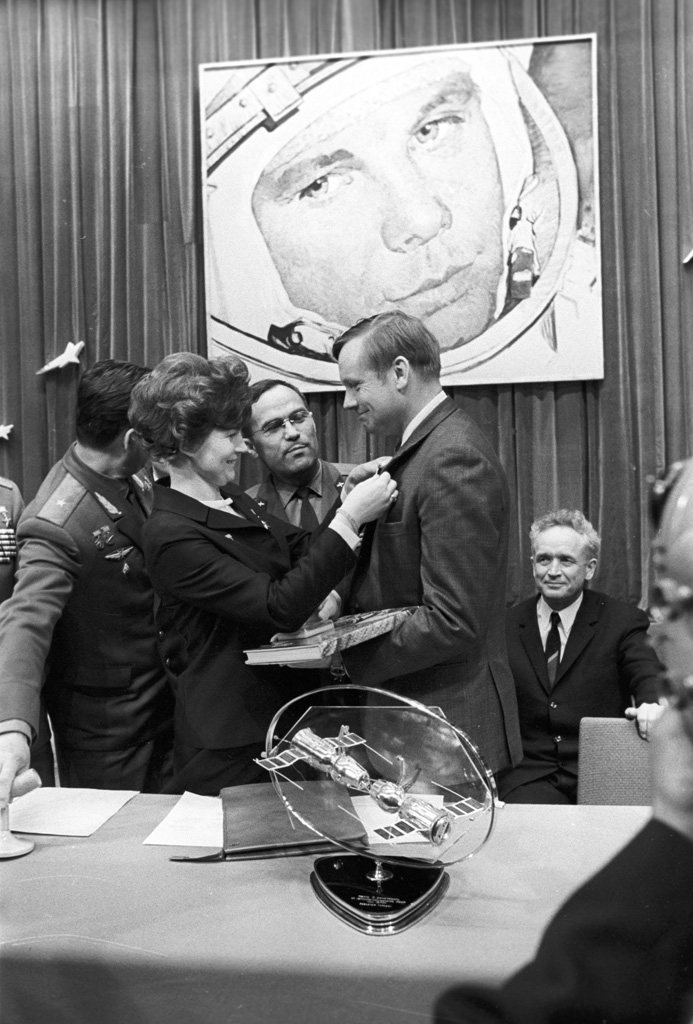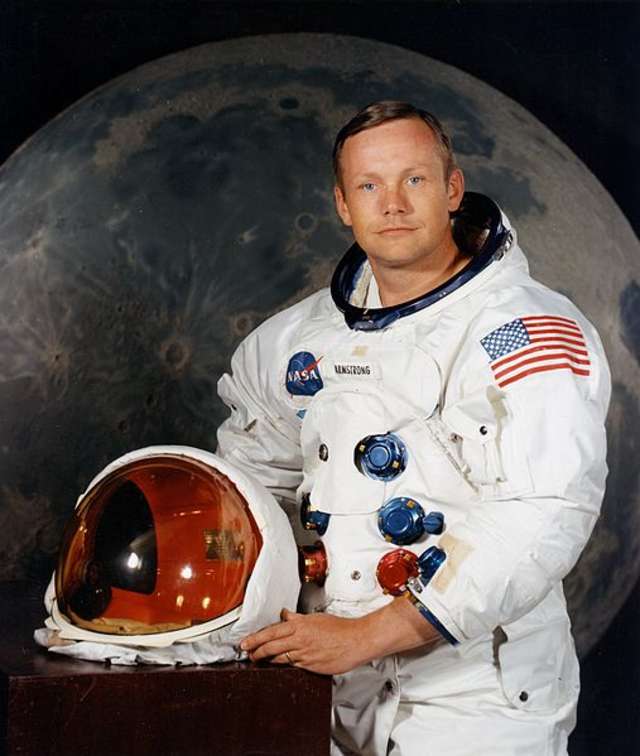How far is the Moon… without Neil Armstrong?
 Despite the hotness of the air and the persistent heatwave, there’s an odd collection of rather chilling stories of late. Of course, the most important and saddest one of them all concerns the footprint – not the Bigfoot footprint, but the legacy – of the first human being to step onto a different celestial body from our own planet, Neil Armstrong. The Moonwalker passed away yesterday, as a result of heart surgery complications, closing perhaps the grandest (and, sadly, not really progressing anymore) chapter of human conquest of space. Neil Armstrong’s legacy still lives on, but the aspiration to fly to the stars is nowhere near as strong as it used to be back in the 1960s and 1970s.
Despite the hotness of the air and the persistent heatwave, there’s an odd collection of rather chilling stories of late. Of course, the most important and saddest one of them all concerns the footprint – not the Bigfoot footprint, but the legacy – of the first human being to step onto a different celestial body from our own planet, Neil Armstrong. The Moonwalker passed away yesterday, as a result of heart surgery complications, closing perhaps the grandest (and, sadly, not really progressing anymore) chapter of human conquest of space. Neil Armstrong’s legacy still lives on, but the aspiration to fly to the stars is nowhere near as strong as it used to be back in the 1960s and 1970s.
People of the 21st century are so far much less enthusiastic about space: NASA’s budget has been cut greatly, the space shuttle program has been laid to rest and actual space flights are now mostly manned and operated from Russia. It’s not a new thing, though. The amount of money NASA receives from the government has been steadily dropping since the 1970s, owing, for the most part, to the two great space mishaps: the Apollo 13 incident and the Columbia shuttle crash.
In fact, it’s public opinion (and not some faceless bureaucrats or Congressmen) that are dragging down the space exploration. The simple fact is, there’s a lot more public mistrust and a lot less enthusiasts of space and space exploration. It all stems from a misconception as to how much money does „the final frontier” actually cost. And it costs around twenty times less than is opined by the public. Current budget stands at USD 17.7 billion, which is less than 0.5% of the budget total, as opposed to 20% estimated by an average Joe in surveys. Space exploration is in dire need of heroes, suspence and happy endings, akin to those offerred back in the second half of the 20th century.

Neil Armstrong was just such a hero. But not everyone remembers that before leaving his footprint on the moon he had a real shot at becoming the first human in space. Even before the historic flight of Yuri Gagarin in April 1961, Americans were readying their own MISS programme (Man In Space Soonest), of which Neil was a part. Luckily, both first moonwalkers (Buzz Aldrin and Neil Armstrong) made it into the Apollo 11 program and – after several near-fatal accidents and mishaps during testing – onto the surface of the Earth’s satellite. Indeed, luck had as much to do with space exploration at the time as planning and precise execution. It’s surprising to see how many errors and accidents occurred during those early flights; during the moon landing descent, Armstrong had to take manual control of the Lunar Lander because of a speed mismatch (and Aldrin caused additional glitches in their computer system, resulting in what we would now describe as „Blue Screens of Death„), the famous phrase „one small step for [a] man, one giant leap for mankind” was grammatically incorrect (the article „a” was inaudible in the recording), getting back to the moon’s orbit for a return flight might have been impossible if it had not been for Buzz Aldrin’s pen (because the astronauts broke the lever that controlled launch of their lander; they had to improvise a lever by using a part of a pen)… In short, all things considered, Apollo 11 crew showed a real knack for improvising under tough circumstances, but those circumstances should never have arisen in the first place.

 At the time, space race between USSR and USA dictated the conditions of the flights and justified huge financing (reaching 4.4% of the national budget in 1966). In many cases, actual success of the missions hinged on quick thinking of the crew members or actual happenstance, rather than full technological preparedness. Problems mid-flight happened mostly due to lack of thorough testing in advance. Nevertheless, Cold War was a spur to the space program, a motivating factor that also positively ignited the public opinion and made household names of Armstrong, Aldrin and Collins (Apollo 11 command module pilot). It fills one’s heart with joy to see that even then, during the hostile era of a world teetering on the brink of nuclear war, astronauts and cosmonauts weren’t in any conflict or competition whatsoever. In fact, at the first moon landing, several items commemorating Yuri Gagarin (who died in a plane crash earlier) and the crew of Apollo 1 who died in a launchpad fire were left on the dusty surface of the moon.
At the time, space race between USSR and USA dictated the conditions of the flights and justified huge financing (reaching 4.4% of the national budget in 1966). In many cases, actual success of the missions hinged on quick thinking of the crew members or actual happenstance, rather than full technological preparedness. Problems mid-flight happened mostly due to lack of thorough testing in advance. Nevertheless, Cold War was a spur to the space program, a motivating factor that also positively ignited the public opinion and made household names of Armstrong, Aldrin and Collins (Apollo 11 command module pilot). It fills one’s heart with joy to see that even then, during the hostile era of a world teetering on the brink of nuclear war, astronauts and cosmonauts weren’t in any conflict or competition whatsoever. In fact, at the first moon landing, several items commemorating Yuri Gagarin (who died in a plane crash earlier) and the crew of Apollo 1 who died in a launchpad fire were left on the dusty surface of the moon.
This is why it’s so incredibly sad to see that it wasn’t technology mishap or lack of financing that finally got the better of the most famous astronaut in the world – he died as a result of complications from a surgery on blocked coronary arteries. Yet there’s some good that can come out of this tragedy. Recent success of the Mars Curiosity mission coupled with a generally positive vibe coming from private space exploration programmes bodes well for future space exploration. Armstrong’s death puts the most miraculous human achievements back into the public eye, reminding people that there’s still so much to strive for and so much to gain from exploring space… Let’s hope that, in time, we might perform yet another small step – this time, onto a surface of a different planet, perhaps in a different star system altogether; and even then we will remember fondly Neil Armstrong, the first man on the moon. Oh, but you can honour him even now; simply wink at the moon the next time you see it – that’s what the Armstrong family think is the best tribute you can give to the man who boldly went where noone had gone before him.

VOCABULARY
despite – pomimo
persistent – uporczywy, stały
odd – przypadkowy, nietypowy
chilling – mrożący krew w żyłach
to concern – tu: dotyczyć
footprint – ślad stopy, tu: scheda, dziedzictwo
legacy – scheda, spuścizna
celestial body – ciało niebieskie
moonwalker – astronauta, który ma za sobą spacer po Księżycu
to pass away – odejść, umrzeć
surgery – zabieg chirurgiczny
grand – wielki, doniosły
chapter – rozdział
conquest – podbój
to live on – żyć dalej, trwać nadal
to cut – ograniczyć, zredukować
space shuttle – wahadłowiec kosmiczny
to lay sth to rest – położyć czemuś kres
space flight – lot kosmiczny
manned – załogowy, z załogą
steadily – stale
owing to – z powodu, za przyczyną
mishap – niefortunny wypadek
crash – wypadek, awaria
faceless – anonimowy, bezimienny
to drag sth down – obniżać (standard, poziom), ściągać coś (w dół)
mistrust – nieufność
to stem from – wywodzić się z, być spowodowanym
misconception – błędne przekonanie
the final frontier – ostateczna granica (o kosmosie)
to opine – wyrażać opinię
to stand at X – wynosić X
as opposed to – w przeciwieństwie do
to estimate – podać w przybliżeniu
average Joe – przeciętny Kowalski
survey – ankieta
human – istota ludzka, człowiek
to ready sth – gotować coś, przygotowywać coś
near-fatal – grożący śmiercią, niemal śmiertelny
surface – powierzchnia
landing – lądowanie
descent – lądowanie, schodzenie w dół
to take manual control – przejść na sterowanie ręczne
Lunar Lander – lądownik księżycowy
mismatch – rozbieżność
glitch – usterka
to result in sth – poskutkować czymś, wywołać coś
Blue Screen of Death – ekran błędu/zawieszenia się systemu operacyjnego
leap – skok
mankind – rodzaj ludzki, ludzkość
inaudible – niesłyszalny
return flight – lot powrotny
lever – dźwignia
to improvise sth – zaimprowizować coś, wymyślić coś na poczekaniu
all things considered – biorąc wszystko pod uwagę, zważywszy na wszystko
crew – załoga
knack for sth – dryg, smykałka do czegoś
to arise – pojawić się
space race – wyścig kosmiczny
to dictate – dyktować, narzucać
to reach – osiągnąć, dosięgnąć
to hinge on – zależeć od
happenstance – szczęśliwy zbieg okoliczności
preparedness – przygotowanie (się)
mid-flight – w trakcie lotu
due to – z powodu
in advance – zawczasu
spur – bodziec, czynik pobudzający
to ignite – zapalić, napawać entuzjazmem
household name – powszechnie znana osoba/marka
to fill one’s heart with joy – napełnić czyjeś serce radością, uradować kogoś
hostile – wrogi, wrogo nastawiony
to teeter on the brink of sth – balansować na krawędzi czegoś, być o krok od czegoś (złego)
competition – rywalizacja
whatsoever – wcale, zupełnie
item – rzecz, przedmiot
to commemorate – uczcić pamięć
launchpad – płyta wyrzutni rakietowej, płyta startowa
incredibly – niezwykle
to get the better of sb – pokonać kogoś
coronary artery – naczynie wieńcowe
some good can come out of sth – coś może wyjść na dobre, coś może dobrze się skończyć
curiosity – ciekawość
coupled with – w parze z
vibe – nastrój, atmosfera
to bode well for sth – dobrze czemuś wróżyć
to put sth into the public eye – zwrócić na coś uwagę opinii publicznej
miraculous – cudowny
achievement – osiągnięcie
to remind – przypomnieć
to strive for sth – dążyć, aspirować do czegoś
to perform – wykonać
fondly – czule, z miłością
to honour sb – uhonorować kogoś, oddawać komuś honory
to wink – mrugnąć, puścić oko
tribute – hołd
boldly – odważnie
-by Prochor Aniszczuk
Dodaj odpowiedź
Musisz się zalogować aby dodać komentarz.







